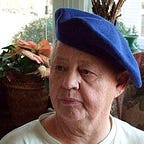My Name is Hajira
NY Times, April 20, 2016: 500 MIGRANTS MAY HAVE DIED. A large boat full of African migrants, headed for Italy from Libya, listed and sank while taking on other passengers from a smaller boat. There were only forty-one survivors, mostly Somalis. I wish I could write a story for each one of you — your story — and a personal eulogy for those who didn’t survive. However, I offer this imaginary experience of one, Hajira, that I hope tells something of your horrendous journey.
My name is Hajira. Musa is my husband’s name.
We had money to pay for the babies.
The others we left with my mother.
Our home is Somalia. We live in Bosaso, going
There when there was war in our country
And no water for crops in the fields.
Musa worked day and night; I cared for others.
For weeks we lived on haleeb shai or milk tea
And canjeero, a thin, sourdough pancake.
At night the babies, two of them, would cry.
I gave them what breast milk I still had.
Sometimes I was all alone. I wept at our plight.
Others in the refugee camp had it no easier.
The camp was so dusty, so noisy, and full of
Sick grandmothers, grandfathers, and children.
I made friends with Falmata who lived nearby.
Her husband had been taken for a soldier.
She was alone, with four children. No others.
At night when Musa worked, I sat with Falmata
In her tent. We shared food. When the children
Slept we talked about our risks as women.
After some months, after Ramadan, Musa brought
News that he could have a job as cattle feeder
For the herds trailed to the outskirts for shipping.
It meant that we could move; life would be better.
We would still live in a tent; it would be dusty.
There would be meat. I never saw Falmata again.
More months passed. My babies began to smile.
They grew teeth to eat meat stew, and my teeth
Quit bleeding. I was attractive to my husband.
Again we had a child, but we were saving money.
Musa whispered to me: “We will go to Italy.”
I thought about my mother; the two older girls.
Where could Italy be? How far must we travel?
It would take all we had saved; maybe my jewelry.
Why should we leave our homeland behind?
After the fourth Ramadan; when Maman was six;
Mamadou was five, and our little princess, two,
Musa told me Ibrahim had made arrangements.
Once again, my eyes became wet. I was fearful.
But it was February in the desert. Cool by day;
Cold by night. The children sleeping between us.
Across Sudan, as lawless as our Somalia,
We traveled as family of the driver, transiting
To the north where other family resided.
Ibrahim had made sure we had documents,
At a price above what we had already paid.
Clearly a bastard, clearly our life blood now.
Daily I looked for reassurance from Musa.
He did what he could to get us tea and bread.
I told stories to the children and sang softly.
It was a long journey. We heard that others
Had been robbed. We heard about murder
In Darfur, all from behind a partition of goods.
We stopped for petrol, prayers, and pissing
It was particularly difficult for me as a woman.
What was I to do but stand and spread my legs?
The children took it, as all children do, even the
Little one throwing handfuls of sand at her brothers.
Musa, poor Musa, a bad tooth allowed no sleeping.
Fortunate that one of the other male passengers
Made a tea of heroin then offered a plug of the raw.
When the pain wouldn’t cease, Musa extracted it.
For a week we traveled or so I heard. What is time
When you are about to change your life forever?
We arrived in a settling dust at the Libyan border.
But by then in another truck, with a different set
Of papers. I had been given a thawb of faded colors
To wear, obviously once worn by a Sudanese woman.
We were now nationals of the Sudan; fortunate to
Keep our given names. Traveling to Italy for asylum.
Ibrahim had been replaced by Isoufou, a Libyan.
The first and last joy of our uncomfortable journey
Was the oasis at Kufra where we finally bathed
The children, splashing in the cool, turbid water.
Musa laughed as he also splashed the living water.
But the abundance of mosquitoes, no respectors
Of persons, suckled at our Somalian limbs of blood.
There was a quality difference of air as we drove
North. I thought I felt the heaviness of sea-laden
Clouds. A phantom of pleasantness arose in me.
Musa, with a much better sense of time, regardless
Of the watch he wore on his wrist, thought it had
Been ten days when we arrived just outside of Tripoli.
And there, once again, we were put into the care
Of another handler, a cruel-looking, heavy man in
Western clothes who never told us his name.
Several confusing days passed. We were forgotten.
But now the children were taking turns vomiting.
We should have saved water and food from Kufra.
One morning we were told to move quickly, and
At the sea’s edge we were hurried into a small
Boat which was brought to the side of a larger one.
The last one for my family. My name is Hajira.
I came from Somalia. My husband said: to find
Safe passage to Italy, to begin anew. Insha’Allah!
Abby Ripley, Poet, New Milford, CT
